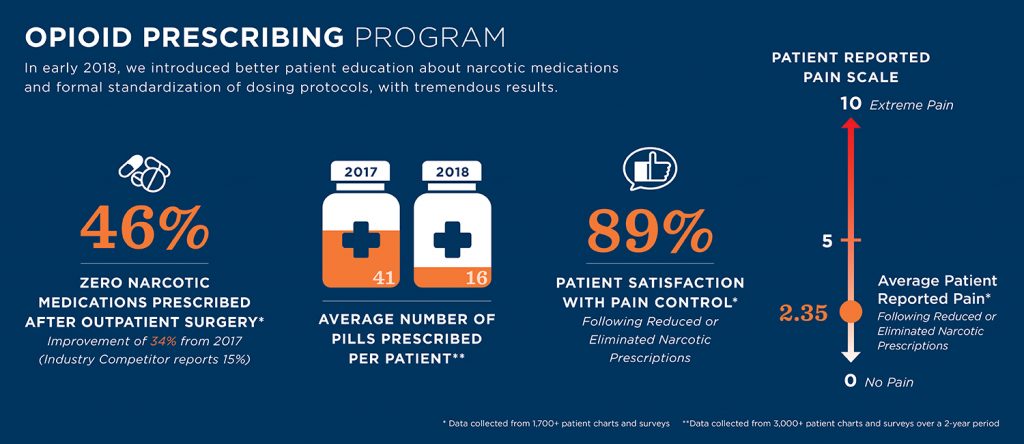
April 4, 2019 - TCO
TCO reports significant reduction in opioid pain medication prescriptions
Twin Cities Orthopedics announced today that its efforts to reduce patient opioid reliance following an orthopedic procedure have resulted in a significant reduction in pain medication prescriptions, improved safe disposal habits of unused medications, while maintaining high patient satisfaction levels.
TCO began the program in spring 2017, and has since surveyed and tracked 3,000 patients’ prescription counts, satisfaction levels as well as disposal habits of unused pain medications. The program’s early findings gave TCO insights to establish formal opioid prescribing practices and protocols in February 2018, to give its physicians prescription guidelines for various orthopedic procedures.
In addition to providing clearer guidelines for its doctors, the program also gave resources to educate patients on the safe disposal of unused pain medications as well as alternative pain management solutions — such as icing and ibuprofen, physical therapy and counseling.
“TCO prides itself on being a world-class leader on innovative approaches to orthopedic and patient care, and this program is an extension of our company values and speaks to how our team strives to be the difference for our patients,” said Troy Simonson, CEO of TCO. “The well-being of our patients is always our primary focus, and this initiative supports and educates patients on more effective and safer approaches to pain management with minimal reliance pain medications.”
TCO Chief Medical Officer Gary Wyard, MD, who oversaw TCO’s prescription protocols, says the lack of extensive research around dosing for acuity of surgical procedures was the basis for creating TCO’s opioid practices and protocols.
“Historically, physician prescribing guidelines were based off what provider mentors advised or what the provider felt was appropriate for pain management of the patient,” Wyard said. “Our approach was to bring teams of our physicians together to align on recommendations to best advise surgeons as to how patients are taking medications, how their pain is managed and alternatives the patients are using for pain control.”
The results
The guidelines resulted in a 61 percent reduction in pills prescribed, a 62 percent drop in prescription strength, and a doubling of safe disposal habits of unused medications.
Among the key findings, according to physicians and patient surveys, as well as patient charts, is a positive reduction in the prescribing of pain medications across a variety of orthopedic procedures. At the start of the program in 2017, TCO reported prescribing on average 41 pills per patient, while in 2018, the pills prescribed dropped to an average of 16 per patient. Notably, nearly half (46 percent) of the patients who had outpatient surgery received zero pain medication prescriptions.
This drop in prescriptions is also reflected in a 62 percent reduction in average overall prescription strength to 110 morphine equivalent units (MEU) during the last year, down from a 293 MEU average in 2017.
Safe pain management
Wyard notes the prescription reduction is a major success story, as patients opted to use TCO-recommended safe pain management alternatives.
“These are encouraging signs that patients can manage their pain by further understanding and putting to practice alternative pain management solutions,” Wyard said. “We are proud of these results and our focus is to continue to monitor and evolve the prescribing practices, make ongoing adjustments, while continuing to measure and track patient-reported pain and satisfaction.”
Pain and satisfaction levels
Importantly, the reduction in prescriptions did not impact the patients’ pain levels: The patients surveyed who received fewer pain medications reported a lower pain level — averaging around a 2 on a scale out of 10, with zero representing no pain — and a higher satisfaction level, averaging nearly 9 out of 10, with 10 representing highest satisfaction.
As part of the program, TCO also created materials to educate patients on how to safely and properly dispose of unused medications, which contributed to a doubling of safer disposal habits of unused medications, compared to previous surveys.


